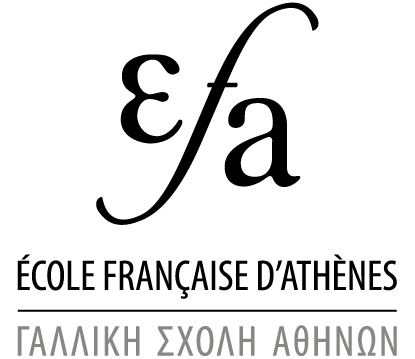De la fouille à la publication : initiation aux méthodes et enjeux de l’étude des vases grecs
(Âge du Bronze – Époque hellénistique)
Athènes, Mégare & Érétrie | 17 – 26 juin 2024
From excavation to publication: an introduction to the methods and issues involved in the study of Greek vases (Bronze Age – Hellenistic period)
Athens, Megara, Eretria | 17 – 26 June 2024








Ce séminaire de formation doctorale était co-organisé par l’EFA, l’EFR, l’ESAG et les projets Amidex de l’Université Aix-Marseille, sous la direction d’Adrien Delahaye, Lou de Barbarin et Tobias Krapf. Douze participantes de cinq nationalités différentes, d’institutions universitaires de France, de Suisse, de Grèce, d’Italie, d’Albanie, d’Ukraine, de Belgique et d’Égypte, ont pu s’initier, matériel au main, à l’identification, au traitement, à la documentation et à l’analyse archéométrique du mobilier céramique.
L’objectif de cet atelier était d’offrir une occasion de se former, sur le terrain et dans les musées grecs, à l’examen, l’identification, l’étude et la documentation du mobilier céramique, et de fournir aux participants et participantes les connaissances essentielles à l’expertise des céramiques grecques datées entre l’Âge du bronze et l’époque hellénistique, ainsi qu’aux enjeux d’analyse historique qu’elles soulèvent. La formation s’adressait à des jeunes chercheuses et chercheurs (master, doctorat, post-doc), amenés à être directement confrontés, par leurs sujets de recherche, à la culture matérielle céramique grecque. Les participantes et participants ont pris part à des visites et des séances de manipulation pour apprendre à identifier, fragments en main, les formes, les argiles et les ateliers.
Les séances se sont déroulées à Athènes, Mégare et Érétrie, à la fois dans les réserves, les musées et sur les sites de Pachi, Paliokastro, Érétrie et Amarynthos, grâce à la collaboration de l’EFA, de l’ESAG, du Musée archéologique national, de l’Éphorie de l’Attique de l’Ouest, de l’Éphorie d’Eubée, du DAI Athènes (Jutta Stroszeck), du Centre d’étude de la céramique moderne (Nikos Liaros), du Fitch Laboratory de la BSA (Evangelia Kyriatzi, Sergios Menelaos et Carlotta Gardner) et de Yannis Nakas.
This training seminar was co-organised by the EFA, the EFR, the ESAG and the Amidex projects of the Université Aix-Marseille, under the direction of Adrien Delahaye, Lou de Barbarin and Tobias Krapf. Twelve participants of five different nationalities from universities in France, Switzerland, Greece, Italy, Albania, Ukraine, Belgium and Egypt were able to learn, with equipment in hand, about the identification, processing, documentation and archaeometric analysis of ceramic objects.
The aim of the workshop was to provide an opportunity to learn, in the field and in Greek museums, about the examination, identification, study and documentation of ceramic material, and to provide participants with the knowledge essential to the expertise of Greek pottery dated between the Bronze Age and the Hellenistic period, as well as to the issues of historical analysis that they raise. The course was aimed at young researchers (masters, doctorate, post-doctorate) whose research subjects would bring them into direct contact with Greek ceramic material culture. Participants took part in visits and hands-on sessions to learn how to identify shapes, clays and workshops, fragments in hand. The sessions took place in Athens, Megara and Eretria, both in the reserves and museums and at the sites of Pachi, Paliokastro, Eretria and Amarynthos, thanks to the collaboration of the EFA, the ESAG, the National Archaeological Museum, the Ephorate of Western Attica, the Ephorate of Euboea, the DAI Athens (Jutta Stroszeck), the Centre for the Study of Modern Pottery (Nikos Liaros), the Fitch Laboratory of the BSA (Evangelia Kyriatzi, Sergios Menelaos and Carlotta Gardner) and Yannis Nakas.
